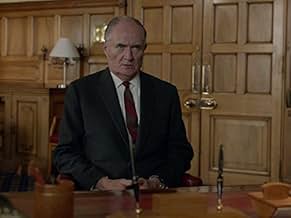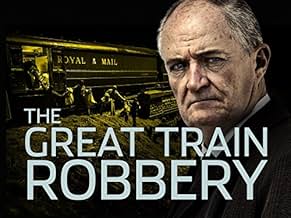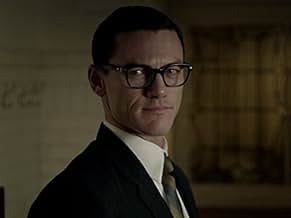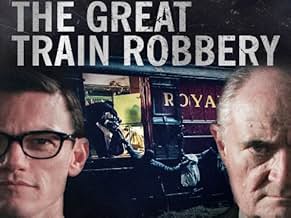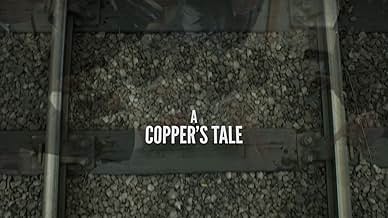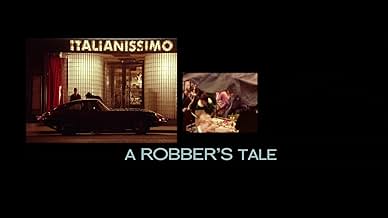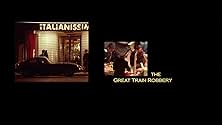Aggiungi una trama nella tua linguaA two-part drama which portrays The Great Train Robbery of 8 August 1963, firstly from the point of view of the robbers and then from the point of view of the police who set out to identify ... Leggi tuttoA two-part drama which portrays The Great Train Robbery of 8 August 1963, firstly from the point of view of the robbers and then from the point of view of the police who set out to identify and catch the robbers.A two-part drama which portrays The Great Train Robbery of 8 August 1963, firstly from the point of view of the robbers and then from the point of view of the police who set out to identify and catch the robbers.
- Nominato ai 1 BAFTA Award
- 4 candidature totali
Sfoglia gli episodi
Recensioni in evidenza
At the time, the Great Train Robbery was the biggest theft in British criminal history and was as much a part of 1963 here as the Profumo Scandal and the emergence of the Beatles. With the fiftieth anniversary of significant events in that year being commemorated right left and centre (the making of the first Beatles album, the first Dr Who TV show, of course the Kennedy assassination), I guess this notorious occurrence was also too big to miss.
With a large cast consisting of some of the best of British male acting talent (female characters hardly get a look-in), painstakingly accurate set design not to mention the actual train itself, the component parts were all there and waiting to be assembled into place. The imaginative decision to break it into two films, the first part concerning the planning and execution of the crime itself and focusing on the criminal gangs which came together to do the misdeed, the second, the aftermath, concentrating on the police investigation run by Jim Broadbent's tough-as-old-boots D.I Tommy Butler, was, on paper, a good one and for the first half certainly successful.
In part one, we see the scheme being formulated by Luke Fisher's bespectacled (obviously marking him out as the brains) Bruce Reynolds the coordinator of the operation, including the recruitment of the necessary personnel, implementation of the crime and the plan on how to escape the law after the robbery. Pacily directed and well-acted by the whole group, the viewer is completely taken into the criminal world and despite myself, caught up in the anticipation and even excitement as they set about their dirty work. I must admit my distaste at the scene where they realise the enormity of what they've done and celebrate with abandon, even though I knew they didn't get away with it for long.
Which leads onto part two, which I felt was altogether less successful. The narrative changes tack and now follows the police investigation into the crime with Broadbent and his weary men one by one picking off the assembled pictures of the perpetrators on their incident-room notice board. Unfortunately at this point the director decides that Broadbent and his team are the UK equivalent of The Untouchables so that we get endless shots of Broadbent grimly gazing at the camera and when they walk, it's in De Palma-esque slow-motion. All the artifice that was stripped away in the impressive first 90 minutes is overloaded into the second one and while there's still drama in watching all the villains get their come-uppance, you completely lose the sense of authenticity built up thus far. The soundtrack was confusing too, quite why 50's Frank Sinatra songs proliferate, I can't tell and for some reason the great Spencer Davis Group song "I'm A Man", cut in 1966 gets played as the background to events from three years before. The use of Nina Simone songs, especially "Sinner Man" did work better but again, like the overall production, they only got this part half-right too.
I almost thought that the two parts must have been directed by two different directors but no, it was just poor execution of a good plan, sort of like how the robbers handled their getaway.
With a large cast consisting of some of the best of British male acting talent (female characters hardly get a look-in), painstakingly accurate set design not to mention the actual train itself, the component parts were all there and waiting to be assembled into place. The imaginative decision to break it into two films, the first part concerning the planning and execution of the crime itself and focusing on the criminal gangs which came together to do the misdeed, the second, the aftermath, concentrating on the police investigation run by Jim Broadbent's tough-as-old-boots D.I Tommy Butler, was, on paper, a good one and for the first half certainly successful.
In part one, we see the scheme being formulated by Luke Fisher's bespectacled (obviously marking him out as the brains) Bruce Reynolds the coordinator of the operation, including the recruitment of the necessary personnel, implementation of the crime and the plan on how to escape the law after the robbery. Pacily directed and well-acted by the whole group, the viewer is completely taken into the criminal world and despite myself, caught up in the anticipation and even excitement as they set about their dirty work. I must admit my distaste at the scene where they realise the enormity of what they've done and celebrate with abandon, even though I knew they didn't get away with it for long.
Which leads onto part two, which I felt was altogether less successful. The narrative changes tack and now follows the police investigation into the crime with Broadbent and his weary men one by one picking off the assembled pictures of the perpetrators on their incident-room notice board. Unfortunately at this point the director decides that Broadbent and his team are the UK equivalent of The Untouchables so that we get endless shots of Broadbent grimly gazing at the camera and when they walk, it's in De Palma-esque slow-motion. All the artifice that was stripped away in the impressive first 90 minutes is overloaded into the second one and while there's still drama in watching all the villains get their come-uppance, you completely lose the sense of authenticity built up thus far. The soundtrack was confusing too, quite why 50's Frank Sinatra songs proliferate, I can't tell and for some reason the great Spencer Davis Group song "I'm A Man", cut in 1966 gets played as the background to events from three years before. The use of Nina Simone songs, especially "Sinner Man" did work better but again, like the overall production, they only got this part half-right too.
I almost thought that the two parts must have been directed by two different directors but no, it was just poor execution of a good plan, sort of like how the robbers handled their getaway.
This two part drama was a retelling of the The Great Train of 1963. The first part was the Robbers Tale which was a straightforward story of the planning and execution of the robbery.
This was the most fascinating aspect of the drama as over the years, the personalities of some of the robbers (Ronnie Biggs, Buster Edwards) has overshadowed the events of the Train Robbery and the main players involved.
Luke Evans, Martin Compston and Paul Anderson give the best performances.
The second part was the Policeman's Tale and featured Jim Broadbent as DCS Butler, hell bent in getting the gang like the sheriff of an old wild west town which was very much how he was introduced.
This was more procedural and not as interesting or riveting as the first part.
Incidentally both parts had different directors but Butler was just too much of a dullard and Broadbent looks too old to even be playing a cop on the verge of retirement.
Able support by Robert Glenister. It is interesting to see that 'Slipper of the Yard' (played by Nick Moran) who in later years seemed to have been more prominent in the media as the cop hunting the train robbers was a more secondary character in this drama.
Well now Slipper is dead he will not be able to sue for his lack of prominence. In the past when he was alive he was rather quick to shout libel for any slight stain on his character!
This was the most fascinating aspect of the drama as over the years, the personalities of some of the robbers (Ronnie Biggs, Buster Edwards) has overshadowed the events of the Train Robbery and the main players involved.
Luke Evans, Martin Compston and Paul Anderson give the best performances.
The second part was the Policeman's Tale and featured Jim Broadbent as DCS Butler, hell bent in getting the gang like the sheriff of an old wild west town which was very much how he was introduced.
This was more procedural and not as interesting or riveting as the first part.
Incidentally both parts had different directors but Butler was just too much of a dullard and Broadbent looks too old to even be playing a cop on the verge of retirement.
Able support by Robert Glenister. It is interesting to see that 'Slipper of the Yard' (played by Nick Moran) who in later years seemed to have been more prominent in the media as the cop hunting the train robbers was a more secondary character in this drama.
Well now Slipper is dead he will not be able to sue for his lack of prominence. In the past when he was alive he was rather quick to shout libel for any slight stain on his character!
I was born any a couple of months after the great train robbery, back in 1963. And I have always been fascinated by it. My dream would be to go on the actual place where it occurred, the Bridego Bridge. I possess nearly every document about it, footage archive and fiction material. The most memorable, of course, remains Peter Yates's ROBBERY, back in 1967, and the other movie starring the actor starring Derrick - sorry I don't remember his name. Some viewers said on IMDb that this feature was not flawless, concerning details specified to UK, for instances trains and cars from this very era. Well, I have never lived in UK, so...But concerning this film, the only thing that annoyed me was the BOAC company heist, at the beginning. These guys are supposed to be professional robbers with a criminal record as thick as a phone book, and they pull the heist without any gloves !!!! Because finger prints, see? Rubbish. For the rest, it is a terrific piece of work, and the character description is absolutely outstanding. I loved the very ending when Bruce Reynolds tells the hard boiled inspector from SY, who chased them in such a raging way all over the years, that he did not do this for money but for "camaraderie" as he actually said, using a french word meaning companionship, brotherhood among friends. An outstanding face to face between those two adversaries. An authentic masterpiece. But it could have shown the several escapes from jail of some of the great train robbers.
I managed to watch this on Amazon prime.
It's nothing to get overly excited about. The over the top cockney accents can get a bit annoying at times. And the acting from some is a bit wooden. But all that being said I did still really enjoy this. You just have to go in to it with the right attitude. Still well worth a watch if you are looking for something easy to follow to kill a few hours. Enjoy.
It's nothing to get overly excited about. The over the top cockney accents can get a bit annoying at times. And the acting from some is a bit wooden. But all that being said I did still really enjoy this. You just have to go in to it with the right attitude. Still well worth a watch if you are looking for something easy to follow to kill a few hours. Enjoy.
"The Great Train Robbery" is a miniseries in two parts. The first part focuses on mid-range crooks, led by Bruce Reynolds (Luke Evans) who decide to rob a train carrying a fortune in money. The second is about the police investigation and search for them.
I really enjoyed the first part, but the second part for me was a let- down. The criminals were more interesting than the police, led by DI Frank Williams (Robert Glenister) for some reason. And I sort of wanted them to get away with it. I'm sure that sounds terrible.
The acting is very good, and since it's based on a true story, it was interesting to see how the police picked up the trail of the crooks and to read at the end what happened to them.
I do recommend it, but you'll find the second part less compelling.
I really enjoyed the first part, but the second part for me was a let- down. The criminals were more interesting than the police, led by DI Frank Williams (Robert Glenister) for some reason. And I sort of wanted them to get away with it. I'm sure that sounds terrible.
The acting is very good, and since it's based on a true story, it was interesting to see how the police picked up the trail of the crooks and to read at the end what happened to them.
I do recommend it, but you'll find the second part less compelling.
Lo sapevi?
- QuizRonald Biggs, one of the last surviving Great Train Robbers, died on 18 December 2013, the same day that this two-part series was first shown.
- BlooperPolice Officers are shown wearing white shirts. In 1963 Constables and Sergeants in all English police forces wore blue shirts. The change to white shirts came in the late 1970s.
- ConnessioniReferences 1855 - La prima grande rapina al treno (1978)
I più visti
Accedi per valutare e creare un elenco di titoli salvati per ottenere consigli personalizzati
- How many seasons does The Great Train Robbery have?Powered by Alexa
Dettagli
- Data di uscita
- Paese di origine
- Sito ufficiale
- Lingua
- Celebre anche come
- 火車大劫案
- Luoghi delle riprese
- Aziende produttrici
- Vedi altri crediti dell’azienda su IMDbPro
- Tempo di esecuzione
- 1h 30min(90 min)
- Colore
Contribuisci a questa pagina
Suggerisci una modifica o aggiungi i contenuti mancanti



